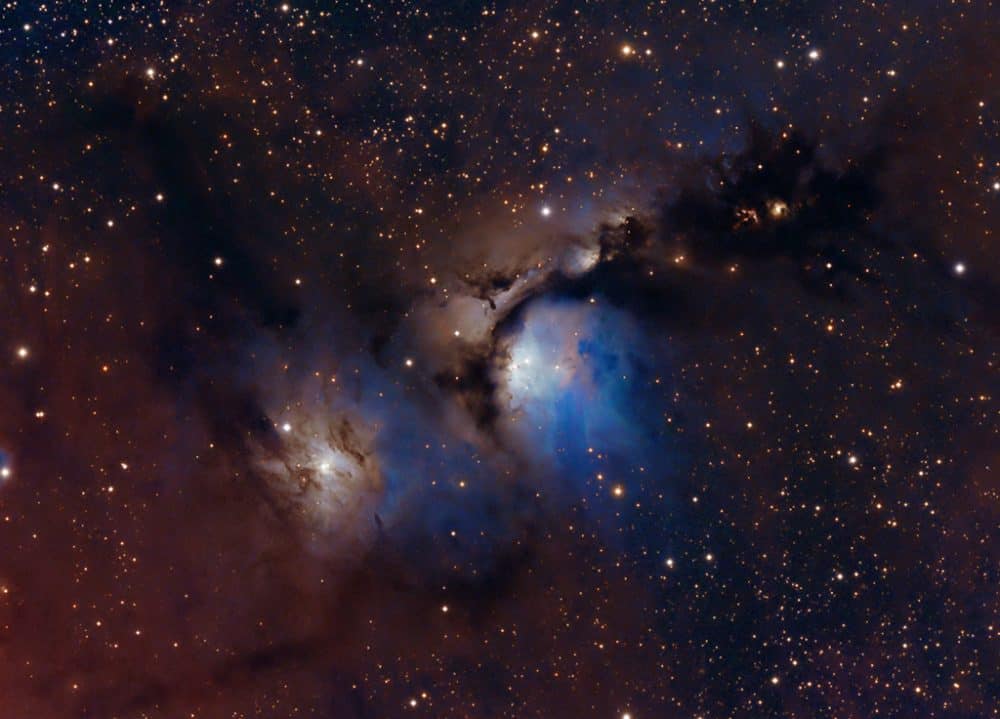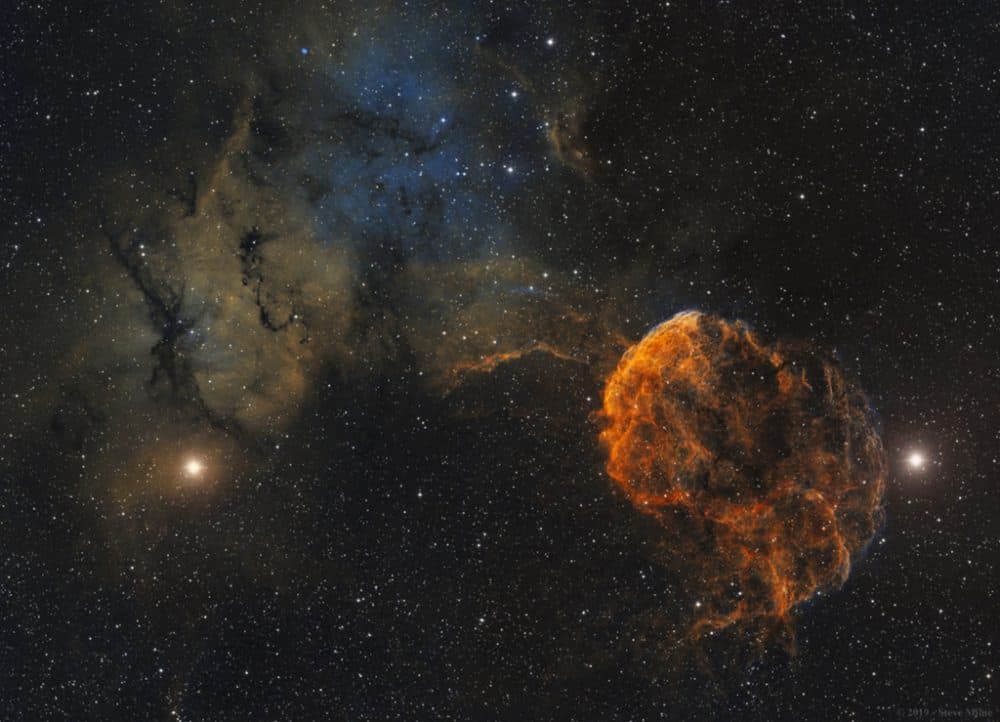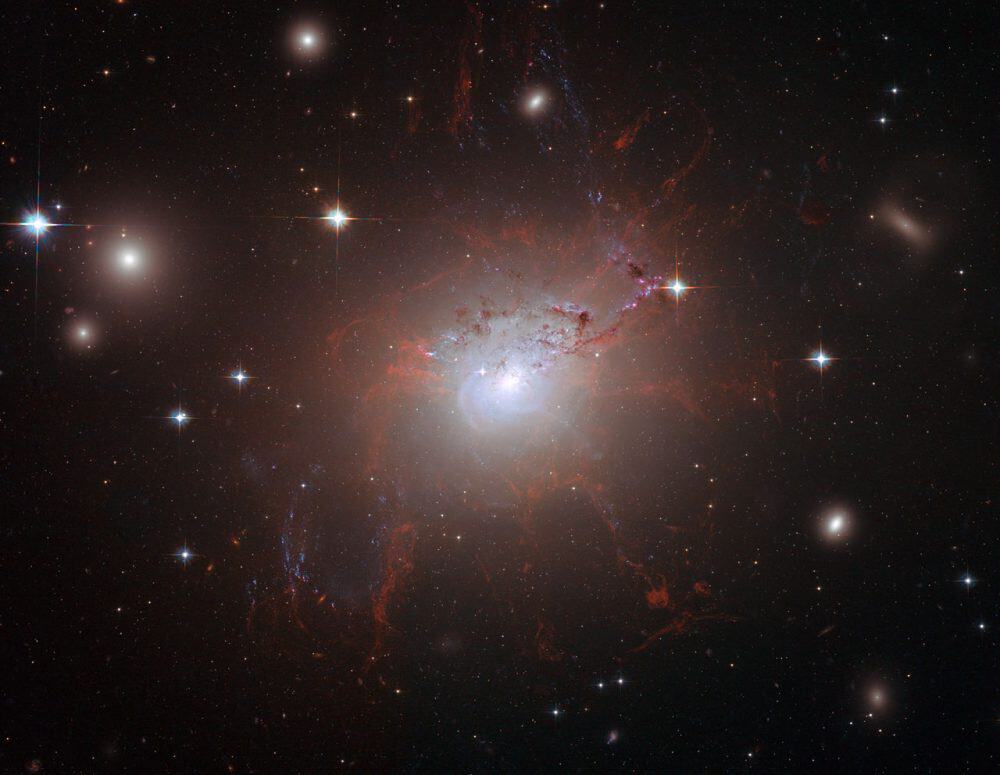Blog
Interstellar dust clouds and bright nebulae abound in the fertile constellation of Orion. One of the brightest, M78, is near the center in this colorful telescopic view, covering an area north of Orion’s belt. At a distance of about 1,500 light-years, the bluish nebula itself is about 5 light-years across. Its blue tint is due to dust preferentially reflecting the blue light of hot, young stars in the region. Dark dust lanes and other nebulae can easily be traced through the gorgeous skyscape that includes many Herbig- Haro objects, energetic jets from stars in the process of formation. But missing from this image is McNeil’s nebula. A major discovery only recognized in 2004, the enigmatic, variable nebula was found along the dark lane of dust above and right of larger M78. McNeil’s nebula is associated with a protostar and seen to be sometimes present and sometimes absent in photos of the well-imaged region. McNeil’s nebula faded from view late last year and is still absent in this deep image recorded in February 2019.
more...Gábor István Szabó (March 8, 1936 – February 26, 1982) was a Hungarian American guitarist whose style incorporated jazz, pop, rock, and Hungarian music.
In 1961, Szabo became a member of quintet that was led by Chico Hamilton and included Charles Lloyd, playing what has been described as chamber jazz, with “a moderate avant-gardism”. Szabo was influenced by the rock music of the 1960s, particularly the use of feedback. In 1965 he was in a jazz pop group led by Gary McFarland, then worked again with Lloyd in an energetic quartet with Ron Carter and Tony Williams. The song “Gypsy Queen” from Szabo’s debut solo album Spellbinder became a hit for rock guitarist Carlos Santana. During the late 1960s, Szabo worked in a group with guitarist Jimmy Stewart He started the label Skye Records with McFarland and Cal Tjader.
more...George Edward Coleman (born March 8, 1935) is an American jazz saxophonist known for his work with Miles Davis and Herbie Hancock in the 1960s. In 2015, he was named an NEA Jazz Master.
After working with Ray Charles, Coleman started working with B.B. King in 1953, at which point he switched to tenor saxophone. In 1956 Coleman moved to Chicago, along with Booker Little, where he worked with Gene Ammons and Johnny Griffin before joining Max Roach‘s quintet (1958–1959). Coleman recorded with organist Jimmy Smith on his album Houseparty(1957), along with Lee Morgan, Curtis Fuller, Kenny Burrell, and Donald Bailey. Moving to New York City with Max Roach in that year, he went on to play with Slide Hampton (1959–1962), Ron Carter, Jimmy Cobb, and Wild Bill Davis (1962), before joining Miles Davis’ quintet in 1963–1964.
His albums with Davis (and the rhythm section of Herbie Hancock (piano), Ron Carter (bass), and Tony Williams (drums)) are Seven Steps to Heaven (1963), A Rare Home Town Appearance (1963), Côte Blues (1963), In Europe (1963), My Funny Valentine, and Four & More, both live recordings of a concert in Lincoln Center for the Performing Arts in New York Cityin February 1964. Shortly after this concert, Coleman was replaced by Wayne Shorter. Nevertheless, Davis retained a high opinion of Coleman’s playing, stating that “George played everything almost perfectly…He was a hell of a musician.” Coleman played with Lionel Hampton (1965–1966), also in 1965 on Chet Baker‘s The Prestige Sessions, with Kirk Lightsey, Herman Wright, and Roy Brooks. Clark Terry, Horace Silver, Elvin Jones (1968), Shirley Scott (1972), Cedar Walton (1975), Charles Mingus (1977–1978), Ahmad Jamal (1994, 2000), and many others.
more...John Smith Hurt (possibly March 8, 1892– November 2, 1966), better known as Mississippi John Hurt, was an American country blues singer and guitarist.
Raised in Avalon, Mississippi, Hurt taught himself to play the guitar around the age of nine. He worked as a sharecropper and began playing at dances and parties, singing to a melodious fingerpicked accompaniment. His first recordings, made for Okeh Records in 1928, were commercial failures, and he continued to work as a farmer.
Dick Spottswood and Tom Hoskins, a blues enthusiast, located Hurt in 1963 and persuaded him to move to Washington, D.C. He was recorded by the Library of Congress in 1964. This helped further the American folk music revival, which led to the rediscovery of many other bluesmen of Hurt’s era. Hurt performed on the university and coffeehouse concert circuit with other Delta blues musicians who were brought out of retirement. He also recorded several albums for Vanguard Records.
Hurt returned to Mississippi, where he died, in Grenada, a year later.
Material recorded by him has been re-released by many record labels. His songs have been recorded by Bob Dylan, Dave Van Ronk, Jerry Garcia, Beck, Doc Watson, John McCutcheon, Taj Mahal, Bruce Cockburn, David Johansen, Bill Morrissey, Gillian Welch, Josh Ritter, Chris Smither, Guthrie Thomas, Parsonsfield, and Rory Block. Hurt was born in Teoc, Carroll County, Mississippi, and raised in Avalon, Mississippi. He taught himself to play guitar at the age of nine, stealthily playing the guitar of a friend of his mother’s, who often stayed at the Hurt home while courting a woman who lived nearby. As a youth he played old-time music for friends and at dances. He worked as a farmhand and sharecropper into the 1920s.
World Music on Flamenco Fridays featuring Bulerias
more...Normally faint and elusive, the Jellyfish Nebula is caught in this alluring telescopic field of view. The entire scene is a two panel mosaic constructed using narrowband image data, with emission from sulfur, hydrogen and oxygen atoms shown in red, green and blue hues. It’s anchored right and left by two bright stars, Mu and Eta Geminorum, at the foot of the celestial twin. The Jellyfish Nebula itself is right of center, the brighter arcing ridge of emission with dangling tentacles. In fact, the cosmic jellyfish is part of bubble-shaped supernova remnant IC 443, the expanding debris cloud from a massive star that exploded. Light from the explosion first reached planet Earth over 30,000 years ago. Like its cousin in astrophysical waters the Crab Nebula supernova remnant, the Jellyfish Nebula is known to harbor a neutron star, the remnant of the collapsed stellar core. An emission nebula cataloged as Sharpless 249 fills the field at the upper left. The Jellyfish Nebula is about 5,000 light-years away. At that distance, this image would be about 300 light-years across.
more...Dan’s repertoire consists of originals and jazz standards, his music is the opposite of where the mainstream jazz sound is today.
Louis Albert Cottrell Jr. (March 7, 1911, New Orleans – March 21, 1978, New Orleans) was a Louisiana Creole jazz clarinetist and tenor saxophonist. He was the son of the influential drummer Louis Cottrell, Sr., and grandfather of New Orleans jazz drummer Louis Cottrell. As leader of the Heritage Hall Jazz Band, he performed at the famous Carnegie Hall in 1974.Louis Cottrell was born into an upper-class Creole musical family. His father, Louis “Old Man” Cottrell, Sr., was a famed drummer, and cornetist Manny Perez was his godfather. The young Cottrell grew up around such great musicians as Barney Bigard, John Robichaux, and A.J. Piron. Cottrell studied clarinet under Lorenzo Tio Jr. and Bigard. He began his career in the 1920s with the Golden Rule Orchestra, and then in 1925 played with Paul “Polo” Barnes. Later in the 1920s he worked with Chris Kelly and Kid Rena, then in 1929 found work on the riverboat SS Island Queen with Lawrence Marrero‘s Young Tuxedo Brass Band and Sidney Desvigne. These were the years when he became a prominent union organizer. He joined Don Albert‘s orchestra soon after, recording an album with the orchestra in 1935 under the Vocalion label. He tried his hand at composing, and with Lloyd Glenn and Albert wrote, “You Don’t Love Me (True).” Rhythm and blues bandleader Paul Gayten would later approach Cottrell to record “You Don’t Love Me” and it became one of the first hits of the R & B New Orleans era, having made it to the number 5 spot nationally on the R & B top ten charts. Cottrell toured widely throughout North America with Albert until 1939.
Joseph Maurice Ravel (/rəˈvɛl/; French: [ʒozɛf mɔʁis ʁavɛl]; 7 March 1875 – 28 December 1937) was a French composer, pianist and conductor. He is often associated with impressionism along with his elder contemporary Claude Debussy, although both composers rejected the term. In the 1920s and 1930s Ravel was internationally regarded as France’s greatest living composer.
Born to a music-loving family, Ravel attended France’s premier music college, the Paris Conservatoire; he was not well regarded by its conservative establishment, whose biased treatment of him caused a scandal. After leaving the conservatoire, Ravel found his own way as a composer, developing a style of great clarity, incorporating elements of baroque, neoclassicism and, in his later works, jazz. He liked to experiment with musical form, as in his best-known work, Boléro (1928), in which repetition takes the place of development. He made some orchestral arrangements of other composers’ music, of which his 1922 version of Mussorgsky‘s Pictures at an Exhibition is the best known.
As a slow and painstaking worker, Ravel composed fewer pieces than many of his contemporaries. Among his works to enter the repertoire are pieces for piano, chamber music, two piano concertos, ballet music, two operas and eight song cycles; he wrote no symphonies or church music. Many of his works exist in two versions: first, a piano score and later an orchestration. Some of his piano music, such as Gaspard de la nuit (1908), is exceptionally difficult to play, and his complex orchestral works such as Daphnis et Chloé (1912) require skilful balance in performance.
Ravel was among the first composers to recognise the potential of recording to bring their music to a wider public. From the 1920s, despite limited technique as a pianist or conductor, he took part in recordings of several of his works; others were made under his supervision.
more...Nazareth
more...This stunning image of NGC 1275 was taken using the NASA/ESA Hubble Space Telescope’s Advanced Camera for Surveys in July and August 2006. It provides amazing detail and resolution of the fragile filamentary structures, which show up as a reddish lacy structure surrounding the central bright galaxy NGC 1275. These filaments are cool despite being surrounded by gas that is around 55 million degrees Celsius hot. They are suspended in a magnetic field which maintains their structure and demonstrates how energy from the central black hole is transferred to the surrounding gas.
By observing the filamentary structure, astronomers were, for the first time, able to estimate the magnetic field’s strength. Using this information they demonstrated how the extragalactic magnetic fields have maintained the structure of the filaments against collapse caused by either gravitational forces or the violence of the surrounding cluster during their 100-million-year lifetime.
This is the first time astronomers have been able to differentiate the individual threads making up such filaments to this degree. Astonishingly, they distinguished threads a mere 200 light-years across. By contrast, the filaments seen here can be a gaping 200 000 light-years long. The entire image is approximately 260 000 light-years across.
Also seen in the image are impressive lanes of dust from a separate spiral galaxy. It lies partly in front of the giant elliptical central cluster galaxy and has been completed disrupted by the tidal gravitational forces within the galaxy cluster. Several striking filaments of blue newborn stars are seen crossing the image.
more...Flora Purim (born March 6, 1942) is a Brazilian jazz singer known primarily for her work in the jazz fusion style. She became prominent for her part in Return to Forever with Chick Coreaand Stanley Clarke. She has recorded and performed with numerous artists, including Dizzy Gillespie, Gil Evans, Opa, Stan Getz, Mickey Hart of the Grateful Dead, Santana, Jaco Pastorius, and her husband Airto Moreira.
In 2002, Purim was the recipient of one of Brazil’s highest awards, the 2002 Ordem do Rio Branco for Lifetime Achievement. She has been called “The Queen of Brazilian Jazz”.Purim was born in Rio de Janeiro to Jewish parents who were both classical musicians: her father Naum Purim played violin and her mother Rachel Vaisberg was a pianist. Flora discovered American jazz when her mother played it while her husband was out of the house.
John Leslie “Wes” Montgomery (March 6, 1923 – June 15, 1968) was an American jazz guitarist. Montgomery was known for an unusual technique of plucking the strings with the side of his thumb which granted him a distinctive sound. He often worked with his brothers Buddy and Monk and with organist Jimmy Smith. Montgomery’s recordings up to 1965 were oriented towards hard bop, soul jazz, and post bop, but around 1965 he began recording more pop-oriented instrumental albums that found mainstream success. His later guitar style influenced jazz fusion and smooth jazz.
His grandson is actor Anthony Montgomery, who was Travis Mayweather on Star Trek: Enterprise.
Montgomery was born in Indianapolis, Indiana. According to NPR, the nickname “Wes” was a child’s abbreviation of his middle name, Leslie.
Montgomery spent two years with the Hampton band. Fear kept him from flying with the rest of the band, so he drove from city to city, town to town, while musicians marveled at his stamina. When arriving at a club, the first thing he did was call home to his wife and family. He was given the opportunity to play with Charles Mingus, Milt Buckner, and Fats Navarro, but not the opportunity he hoped for, and he returned to Indianapolis a better player, though tired and discouraged. He resumed performing at local clubs, this time with the Eddie Higgins Trio and the Roger Jones Quintet, playing with Eddie Higgins, Walter Perkins, and Leroy Vinnegar. He joined his brothers Buddy and Monk and vibraphonist Alonzo “Pookie” Johnson in the Johnson/Montgomery Quintet, somewhat in the style of George Shearing. The band auditioned for Arthur Godfrey and recorded sessions with Quincy Jones. After a residency at a club from 1955 to 1957, Montgomery and his brothers went west.
more...Howard McGhee (March 6, 1918 – July 17, 1987) was one of the first bebop jazz trumpeters, with Dizzy Gillespie, Fats Navarro and Idrees Sulieman. He was known for his fast fingers and very high notes. What is generally not known is the influence that he had on younger hard bop trumpeters, with Fats Navarro.
In 1946–47, some record sessions for the new label Dial were organized at Hollywood with Charlie Parker and the Howard McGhee combo. The first was held on July 29, 1946. The musicians were Charlie Parker, Howard McGhee, Jimmy Bunn , Bob Kesterson, and Roy Porter. With Parker close to a nervous breakdown, he played “Max is Making Wax”, “Lover Man“, and “The Gypsy”
more...https://www.youtube.com/watch?v=uzYXIhY8QnU
more...More Posts
- Earl Hines
- World Musi Amayo
- Daily Roots King Tubby
- Lasagna Napoli Christmas Eve 2024
- Rumi The Universe
- Lau Tzu Present
- Temple Israel Erev Shabbat Service
- Cosmo IRAS 20324+4057
- Terry Bozzio
- T.S. Monk
- Bill Crow
- Flamenco Fridays Paco de Lucia
- Daily Roots Cornell Campbell
- George Winston
- Happy Kwanzaa 2024
- Cosmos NGC 5643
- Glyn Johns
- Billy Bean
- John Scofield
- World Music Ensemble Chakâm feat Christine Zayed



